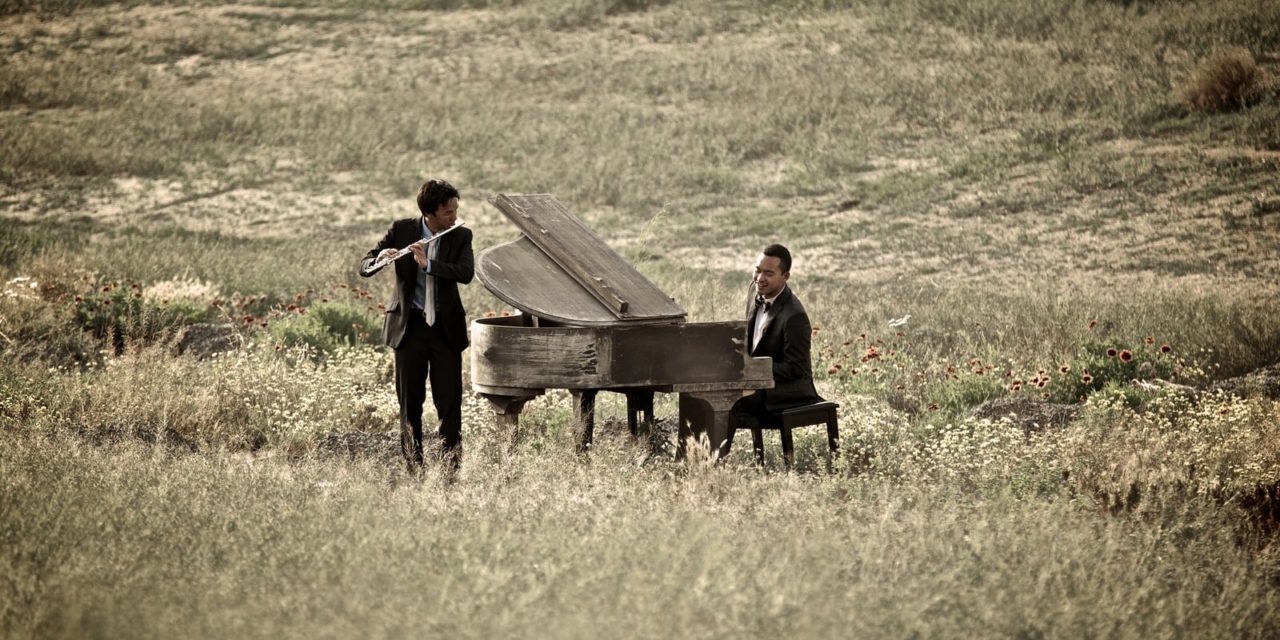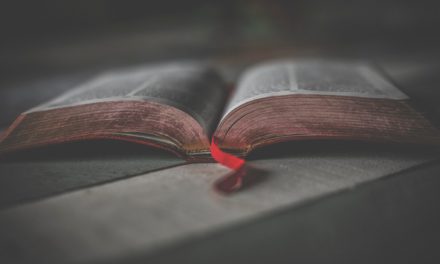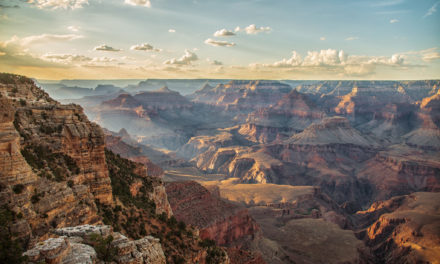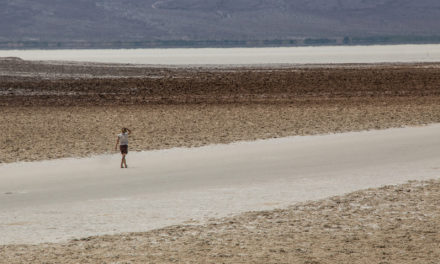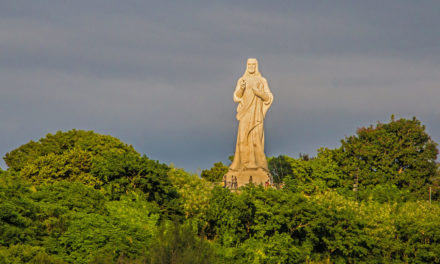You who live in the shelter of the Most High, who abide in the shadow of the Almighty, will say to the LORD, “My refuge and my fortress; my God, in whom I trust.” For he will deliver you from the snare of the fowler and from the deadly pestilence; he will cover you with his pinions, and under his wings you will find refuge; his faithfulness is a shield and buckler. You will not fear the terror of the night, or the arrow that flies by day, or the pestilence that stalks in darkness, or the destruction that wastes at noonday.
A thousand may fall at your side, ten thousand at your right hand, but it will not come near you. You will only look with your eyes and see the punishment of the wicked.
Because you have made the LORD your refuge, the Most High your dwelling place, no evil shall befall you, no scourge come near your tent. For he will command his angels concerning you to guard you in all your ways. On their hands they will bear you up, so that you will not dash your foot against a stone. You will tread on the lion and the adder, the young lion and the serpent you will trample under foot.
Those who love me, I will deliver; I will protect those who know my name. When they call me, I will answer them; I will be with them in trouble, I will rescue them and honor them. With long life I will satisfy them, and show them my salvation.
~ Psalm 91
Exegetical Reflection
God protects from all harm those who trust Him. The many terms for protection, shelter, refuge, and the like emphasize the theme. A speaker in the first person addresses an audience, encouraging them to trust God so no harm will befall them (vv 1-13); God responds (vv 14-16). According to some commentators, “the shelter of the Most High” is the Temple, and the psalm was part of the liturgy for entering or departing from the Temple. Perhaps the language is metaphorical whether or not the dangers are from demons or from the ordinary dangers of plague (Covid 19!), war, or wild animals. “Most High” (Elyon) and “Shaddai” are old epithets for God, used in common with Canaanite religion. “Wings” may be a metaphor for divine protection or may refer to the wings of the cherubim on either side of the Ark. God protects at all times, night and day. Even if all those who do not have God’s protection fall, the one who trusts in God will be safe. The length of days is a sign of God’s favor and is especially welcome after Ps. 90, which dwells on the shortness of human life.
—Lawrence Geraty
Descriptive-Theological Reflection
For the five and a half weeks between my wife’s diagnosis with pancreatic cancer and her death, Psalm 91 was my prayer. I breathed that hope, but when she breathed her last, I felt that psalm was eviscerated, disemboweled, not worth the paper it was written on. One and a half years later I would say this. Psalm 91 is not a fortune cookie one can pull out at will; nor is any other psalm. They are rather the heart-felt utterances reflecting every experience of life. We find ourselves in them and identify with their pleadings and praises. They aren’t magic, nor really promises for that which we might wish.
Psalm 91 comes to life in our suffering and our expectation of deliverance. That deliverance may not be by our script, but it is our salvation. It is a song of hope, a song of trust. Somehow, somewhere, that prayer will not be turned away empty. The enduring faith of the writer is our example: “He is my refuge and my fortress; My God, in Him I will trust.” Not all are spared the plague (vs 10), not all see long life (vs 16). Yet we may know He will be with us in our trouble (vs 15).
—Kent Bramlett
Systematic-Theological Reflection
Psalm 91 is not a prayer, but a poem, not a supplication, but a song. As poem and music, it is art. Art presents a mode of revelation. Enter the creative world of the artist and you permit your eyes and ears to be opened. It plots a breakthrough for truth: but in an uncanny way. Picasso’s definition of art (“a lie that makes us realize the truth”) suggests that the artists’ skill resides in their ability to distort our already broken creation. Like a caricature, they deform in order to reveal the truth of our vexed reality. The art form of music describes that vexation with the noise of strings: like Jubal “the ancestor of all those who play the lyre and pipe” (Genesis 4:21). It squeezes from the human spirit notes that cannot be heard in the limited sounds of the ordinary prose. When the devil tempted Jesus, he quoted verses 11 & 12 of Psalm 91. Even devils recognize that biblical poems can be used as “a lie that makes us realize the truth.” Whether our music drone secular blues or chime sacred hymns, the human spirit strains to be heard. Our bodied-spirits express creative freedom for good or evil.
How do Christians judge the lyric of a psalmist who puts a lie to melody to make us realize the truth; a sacred musician who (with a verse promising him long life) writes a song that outlived his person; a poem that touts an incomplete theology? How do we remain faithful to our vocation as art critics? The doctrines of creation, human nature, and sin inform our verdicts. Christians cannot in good faith embrace the principle of “art for art’s sake.” Art is for the sake of faith. Here, the secular/sacred divide does not govern (as though art can only be for Christ’s sake if it’s themes are religious). Yet, we remain art critics, especially of those artifacts where the art is certified as sacred scripture. Can we embrace Psalm 91 as art for Christ’s sake?
In the midst of death and dying, the thousands and tens of thousands who fall to the deadly COVID 19 pestilence (a virus that stalks in the silence of darkness), we can embrace Jesus’ vocation to resist a temptation. In the desert, Jesus rebuffed, “do not tempt the Lord.” Jesus knew his deadly pestilence would, in the end, come at the hands of men. Resist the temptation to hear, in this song, delusions of false protection. Don’t tempt the Lord with our presumptions that, in this life, good people get good rewards and bad people get bad rewards. The Father of Jesus causes rain to fall (as he does sun to shine) on the just and the unjust. When the promises envisioned in this poem fail to deliver, the Father’s grace renews like the sun and the rain. If, the shelter of the Most High is the temple, then maybe as we shelter in place (kept from our houses of worship), our call is to silently listen (as faithful art critics) to the secular spirituals that clamor in the streets. Bear witness to new tunes, which are different ways that “lies make us realize the truth”: the truth that God still creates and redeems. The sacred musician had his turn. Now let’s hear secular spirituality express art for Christ’s sake; that is, Christ who is also Lord of our broken world.
—Maury Jackson
Pastoral Reflection
Always alongside light there is the presence of darkness. It is the shadows that allow us to see since we would be blinded by pure light. And it is in contrast with the darkness that we get to know the light. When we are able to perceive the world from the perspective described in this Psalm, we may find that there are opportunities for life even when there is darkness all around us.
However, often our primary goal in this culture is to be in control. We feel the incessant need to control our health, our finances, our career, and ultimately, our destiny. Controlling one’s life may be good on some practical levels, but in the larger picture of life, it is not the truth. Our mistakes, our disappointments, our own aging bodies prove to us that we are not fully in control. But this can become a positive breakthrough. Rather than agonizing in the negativity of losing control, we might discover an awareness of divine providence and protection in the midst of shadow, sickness, and destruction. Accepting that we are not in control of the world around us is simply to situate ourselves correctly in the universe. Our life and its destiny are a gift from God. Our dependence on God’s deliverance, according to this Psalm, is precisely how our life’s journey is going to unfold.
Try practicing the release of control early. This can be done in small steps, such as incorporating some the words of this Psalm in your own prayer.
—Otis Coutsoumpos
May you never lose sight of God’s grace and love!
Be well!
—HMS Richards Divinity School
